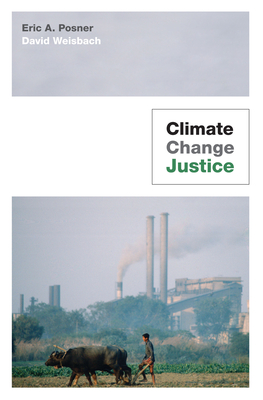

 Princeton University Press
Princeton University Press
Climate Change Justice


Key Metrics
- Eric A Posner
- Princeton University Press
- Hardcover
- 9780691137759
- 9.41 X 6.44 X 0.79 inches
- 1.01 pounds
- Political Science > Public Policy - Environmental Policy
- English
 Secure Transaction
Secure TransactionBook Description
A provocative contribution to the climate justice debate
Climate change and justice are so closely associated that many people take it for granted that a global climate treaty should--indeed, must--directly address both issues together. But, in fact, this would be a serious mistake, one that, by dooming effective international limits on greenhouse gases, would actually make the world's poor and developing nations far worse off. This is the provocative and original argument of Climate Change Justice. Eric Posner and David Weisbach strongly favor both a climate change agreement and efforts to improve economic justice. But they make a powerful case that the best--and possibly only--way to get an effective climate treaty is to exclude measures designed to redistribute wealth or address historical wrongs against underdeveloped countries.
In clear language, Climate Change Justice proposes four basic principles for designing the only kind of climate treaty that will work--a forward-looking agreement that requires every country to make greenhouse-gas reductions but still makes every country better off in its own view. This kind of treaty has the best chance of actually controlling climate change and improving the welfare of people around the world.
Author Bio
Eric Posner is the Kirkland and Ellis Distinguished Service Professor of Law and Arthur and Esther Kane Research Chair.
His research interests include financial regulation, international law, and constitutional law. His books include Radical Markets (Princeton, 2018) (with Glen Weyl); Last Resort: The Financial Crisis and the Future of Bailouts (University of Chicago Press, 2018); The Twilight of International Human Rights (Oxford, 2014); Economic Foundations of International Law (with Alan Sykes) (Harvard, 2013); Contract Law and Theory (Aspen, 2011); The Executive Unbound: After the Madisonian Republic (with Adrian Vermeule) (Oxford, 2011); Climate Change Justice (with David Weisbach) (Princeton, 2010); The Perils of Global Legalism (Chicago, 2009); Terror in the Balance: Security, Liberty and the Courts (with Adrian Vermeule) (Oxford, 2007); New Foundations of Cost-Benefit Analysis (with Matthew Adler) (Harvard, 2006); The Limits of International Law (with Jack Goldsmith) (Oxford, 2005); Law and Social Norms (Harvard, 2000); Chicago Lectures in Law and Economics (editor) (Foundation, 2000); Cost-Benefit Analysis: Legal, Economic, and Philosophical Perspectives (editor, with Matthew Adler) (University of Chicago, 2001).
He is a fellow of the American Academy of Arts and Sciences and a member of the American Law Institute.
- Education
Harvard Law School - JD, magna cum laude, 1991- Yale University - BA, MA philosophy, summa cum laude, 1988
Source: The University of Chicago Law School
Videos








Community reviews
Write a ReviewNo Community reviews